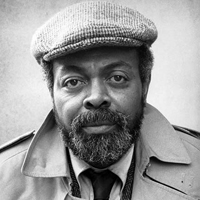The New World by Amiri Baraka: Critical Analysis
The poem ironically portrays a picture of an American city in the evening. The city looks radically different in the evening than it looks during the day. The so-called civilization, sophistication and decency vanish and they are replaced by poverty, tricky, chaos and barbarism.

Amiri Baraka (1934-2014)
So the poet calls it a new world to suggest the two parts of lives in the same city. It has enough dramatic dimensions decorated with description that provide a carnivalisque atmosphere. The setting is the evening (the sun is folded). The day's hullabaloo is gradually dwindling into dusk, which invites another set of atmosphere, people and their behavior and their life style. Vehicles stop and move out of the streets, workmen, tired of their day's work move towards their lodgings. Children are gathered and driven home. Loafers and beggars emerge on the same. Some watches out to the emptying streets. Mourners singers and liars make their appearances as if they have right to enjoy their lives in the evening and at night. The poet attaches an alliterative, but subtle phrase to mark their gestures 'ridiculous righteousness.' The speaker is a part of that new world as he uses 'my doubles,' our arrogance' to depict the chaotic, uncontrollable ways of behavior. This is the world of dejected people who adopt an unconventional style of life, defy rules and traditionally accepted norms, all of these under sever obligation. The speaker indirectly hinted at the erosion of modesty into the disorderly culture that sneezes into the form of hippy life.
Disadvantaged, socially marginalized people find their ways to this world populated with 'wasted lyricists' dreamers, who gather in gangs. No individuality and solitude are preferred. They are 'mystics' in two-pants suits. The term' mystics' is to demonstrate the incoherent 'indecipherable pattern of behavior shown to search for a value and joy in disorder. A noticeable world 'beatniks' points out the beat movement that flourished in 60s of American as the one that challenged the moderate, boring, discriminating patterns of society and embraced vulgarity and openness as their ways of newer society. The speaker gives a flavor of secularity and obscenity through the phrase: the lust of the world'
Those guys are so absorbed in their world that they forget everything, indulge themselves into orgiastic activities sans bondage, scrutiny or modesty. They dance, dream and abandon the sanity of life. Idiosyncrasies are unsurpassable. The speaker, one of the active participants, asks for permission to dream, to wander and to appease a hunter of living in a fantasy.
The last two lines probe subtly into the origin of this vulgar culture that is defect of love and a fantasy of defeat. This pervasion has sprouted from lifelessness, discrimination, irregularity and suppression of human desire.
The form of the poem itself exhibits the deviation of the path as the second stanza pushes itself toward the right that indicates the lack of firmness among the people in the new world. The last stanza attempts to come to the normal yet deviates. These three stanzas stand for the inconstancy of the beat's life, which is swayed by impulses and dreams.
The poem is ironical in tone, but provides a realistic picture. The underlying theme is that no one wants to be odd and heretic; it is the result of social attitudes and hostilities meted out by the victims. The poem more or less carries a theme of Ginsberg’s 'Howl'. But it is more polished in diction and less severe in irony.
Cite this Page!
Sharma, Kedar N. "The New World by Amiri Baraka: Critical Analysis" BachelorandMaster, 31 Oct. 2013, bachelorandmaster.com/britishandamericanpoetry/the-new-world.html.
